 Indians Archive
Indians Archive  Tribe Game Vault: 9/25/49. Showman Veeck Coaxes Lupica Down from his Perch
Tribe Game Vault: 9/25/49. Showman Veeck Coaxes Lupica Down from his Perch
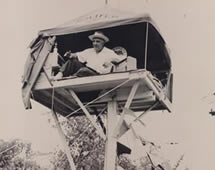 The catchword for this week has been “wistful”. I looked that up in the dictionary, and learned that its etymology involves an obsolete word meaning, “a melancholy mood due to unreasonable and unrealized expectations of the Cleveland Indians baseball franchise.” It’s a familiar, yet discomforting, emotion that encourages the absentminded consumption of large quantities of chocolate chip cookies.
The catchword for this week has been “wistful”. I looked that up in the dictionary, and learned that its etymology involves an obsolete word meaning, “a melancholy mood due to unreasonable and unrealized expectations of the Cleveland Indians baseball franchise.” It’s a familiar, yet discomforting, emotion that encourages the absentminded consumption of large quantities of chocolate chip cookies.
In other words, I have been wallowing in a low level of self-pity. And I do know: this does not stem from the escapades of the Tribe. How pitiful indeed would that be, right? I mean, we all know that is what the Browns’ exhibition season is for. Nah, my issues obviously have much more to do with our older daughter heading off to college, for her senior year.
What can I say? We just miss her when she is gone. She’s the kind of girl who has so much going for her. When people meet her, you can sometimes see them wondering if they had underestimated me a little (they rightly come to realize the credit goes to my wife).
And now, our daughter is that much closer to leaving the nest. Of course, this is good, and is exactly what we want for her; it just causes momentary… wistfulness.
After I left her at school the other day, I picked up a giant cup of the excellent black coffee they sell at the sandwich shop in the student center. In a routine I have followed maybe six or eight times over the last three years, I padded through the parking lot, and shot a (wistful) glance at her old freshman dorm. Upon climbing into my car, I lit up an Arturo Fuentes Curly Head and began the trip home. The droning radio dutifully reported that the Cleveland Indians were once 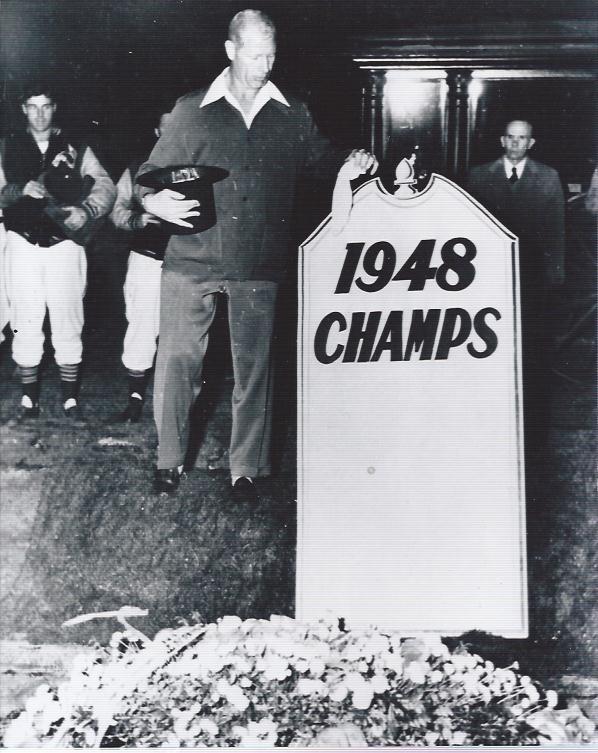 again hopelessly behind that afternoon, with several innings yet to be played. The game was a fitting metaphor for this entire season.
again hopelessly behind that afternoon, with several innings yet to be played. The game was a fitting metaphor for this entire season.
I always thought following sports was meant to be a fun diversion from the realities of life. So, the question is never very far from the surface: why is it so tough to be a Cleveland fan? Sometimes, you just have to will yourself to find joy. Happiness is commonly a choice.
I recalled a story about the Tribe, from the 1949 season. Bill Veeck was the owner, and the team was fresh off their 1948 World Series championship. Expectations were high. They were still a really good team - they boasted seven future hall-of-famers – but their nemesis around that era, the New York Yankees, were having a better season. The Tribe’s rough start was made worse by a stretch in May when they lost 8 of 10 on a tough road trip.
Veeck announced that the Indians were going to wipe the slate clean: upon their return home, they would hold another Opening Day. There was a ceremonial flag-raising, marching bands played, and the mayor threw out the first pitch.
By the end of the month, the Indians were still in seventh place. Cleveland druggist/grocer/confectioner/deli owner (depending on the account you read) Charley 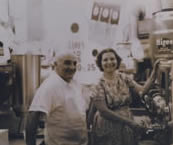 Lupica was having some beers with some friends at a local bar. Some fellow patrons were loudly shouting the praises of the Yankees, and dismissing the Indians. (These were native Clevelanders. I’d thought the bandwagon segment of Northeast Ohio only dated back to the 1980s’ Celtic-gear-wearing crowd at the old Coliseum. It apparently goes back much further.)
Lupica was having some beers with some friends at a local bar. Some fellow patrons were loudly shouting the praises of the Yankees, and dismissing the Indians. (These were native Clevelanders. I’d thought the bandwagon segment of Northeast Ohio only dated back to the 1980s’ Celtic-gear-wearing crowd at the old Coliseum. It apparently goes back much further.)
Not until recently have I realized just how likeable this Charley Lupica was. It’s too bad he has been dead for about ten years- he would have been a great guy to meet. 100% pure Cleveland fan.
The 38-year-old Lupica took exception to those bandwagon Yankee fans back at the bar in May of 1949. To him, it was just a matter of time until the Indians began winning on a regular basis, once again assuming the mantle of the best team in baseball. He said if they liked the Yankees so much, they should go live in New York. It was then that he was issued a challenge. “If you like the Indians so much, why don’t you sit on a flagpole until you die up there?”
Lupica built a 4’ by 4’ platform, and attached it atop the flagpole that stood above his store on Wade Park Avenue. He climbed up into the perch (currently, variously recorded at heights of 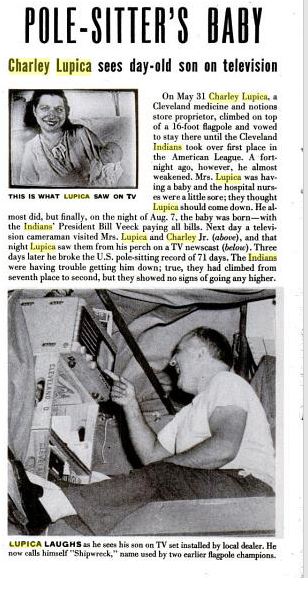
Donations rolled in from various sources: a canvas was used as a curtain for privacy. A television set and a radio were installed so Charley could keep up with his Indians. He had lights, and a public address system. Somehow, toilet ‘facilities’ were installed (some sanitation department authorities questioned the legality of Lupica’s stay atop the perch, but they were overruled). Lupica’s wife sent his meals to him, and they were raised to his perch every day.
(Let’s talk about Mrs. Lupica. What a trouper. The meals were one thing… She actually gave birth to their fourth child while Charley was in his perch! He was able to see her and their baby on TV. Veeck had arranged to pay for all their bills, and had an ambulance waiting for when it was ‘time’. Mrs. Lupica’s comment? “If Charley can live on a platform, I suppose I shouldn’t complain about the ordinary business of having babies.” Hahaa!)
While Lupica was atop his perch, he received throngs of visitors. Some were there to make sure he didn’t cheat and come down, but most were well-wishers from the neighborhood. Indians pitcher Satchel Paige paid him a visit. Charley already had a reputation as a public promoter of his store- like Veeck, only on a small scale. It wasn’t an easy run, though: he endured several 100+ degree days, and pranksters occasionally messed with him. Like the time kids showered him with firecrackers to celebrate the Fourth of July.
The Indians crept closer to first place during that 1949 season, climbing to within 2 ½ games of the Yankees on August 2nd. That would be as close as they would get, however. By September 23rd, with the Tribe mathematically eliminated from the race, (a wistful) Veeck staged a mock funeral for the 1948 pennant. A horse-drawn hearse appeared behind the center field wall prior to the game, and the pennant was laid onto a shallow grave and was ‘buried’. Manager Lou Boudreau and Indians beat writers comprised the procession as the home crowd looked on. Some ‘passages’ from The Sporting News (Baseball’s ‘Bible’) were read, and Veeck dabbed at his eyes with a giant white silk kerchief, in an exaggerated manner. (The pennant was removed from the field later that night, once the stadium had emptied.)
On Sunday, September 25th, it was time for Charley Lupica to come down from his perch. Bill Veeck had arranged for the entire perch assembly to be removed and loaded onto a flat-bed truck. Lupica was transported the 5 miles to the stadium, and after 113 days, he descended in the presence of the appreciative 33,977 in attendance (nurses and an ambulance were on hand, just in case). Veeck presented Lupica with several gifts: a 50ft flagpole for his store, a bed, a bathtub, a gas range, bicycles and puppies for his children, and a new Pontiac sedan. Wow. Lupica fought back tears as he viewed his children- including his new baby, for the first time in person.
During the game on the 25th, Tribe starter Bob Lemon went the distance (improving to 21-10) in defeating Detroit Tiger standout (and future Indian) Art Houtteman, 7-1. The Tribe scored 2 in the 2nd and 4 in the 8th. The middle of the order did the major damage, as 1B Mickey Vernon, CF Larry Doby, RF Luke Easter and 3B Bob Kennedy went a combined 7 for 14, with 3 RBI and 7 runs scored. The Indians went on to win the other six games remaining in the season, all on the road.
There’s a lesson in that story (one that does not involve camping atop a flagpole for 4 months). Lemons, lemonade. It is a choice.
I’m working at it. I’ll get there. It’s a process.
Thank you for reading. Sources included Associated Press reports of Lupica's death; The Cleveland Indians Encyclopedia by Schneider; www.baseball-reference.com; Wikipedia; Frank Watson, reporting for the INS news service; www.lorainstation.nhlink.net/ls/memories.htm.
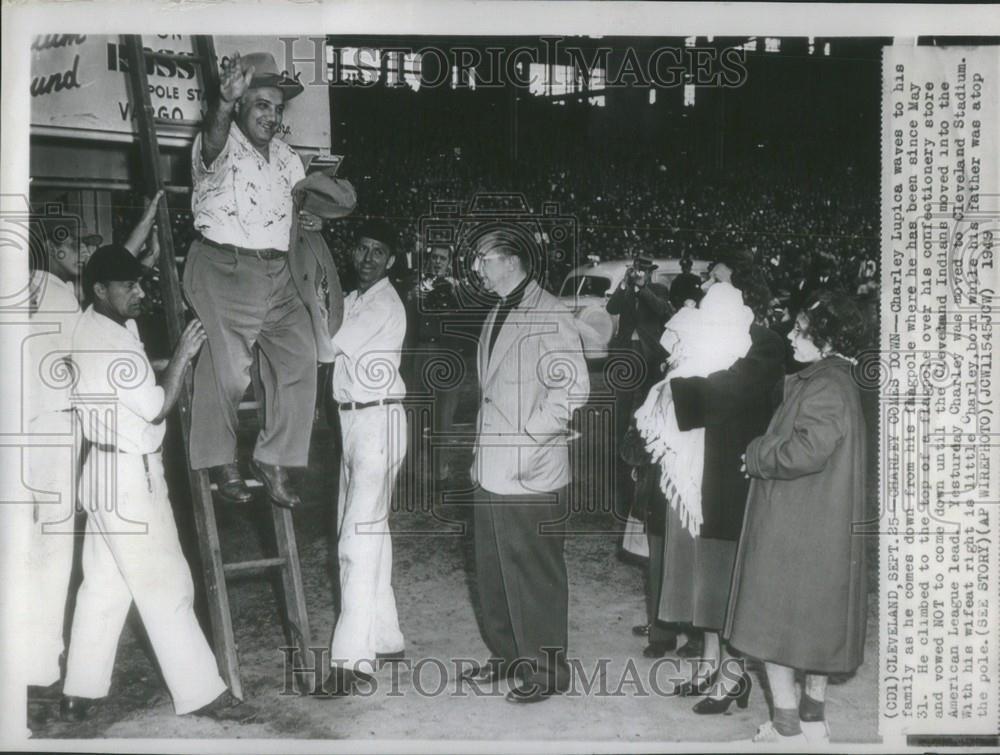
- NBA Announces 2013-2014 Schedule
- Browns Ink Sharknado
- Sharknado A No-Show For Rookie Camp
- Trent Richardson Out Until Training Camp
- Browns Sign Brandon Jackson
- Carrasco Suspended Eight Games
- Browns Add to Wide Receiver Depth with David Nelson
- Browns Need to Learn from Past Draft Mistakes
- Browns Release Chris Gocong and Usama Young
- Browns Missing on Grimes Disappointing, But Not The End
The TCF Forums
- Chris Grant's first 3 drafts
Kingpin74 (Tuesday, January 21 2014 10:13 AM) - The 2014 Offseason Thread
googleeph2 (Tuesday, January 21 2014 9:36 AM) - 2015 Recruiting
furls (Tuesday, January 21 2014 6:57 AM) - Mike Brown
YahooFanChicago (Monday, January 20 2014 11:15 PM) - Movies coming out
HoodooMan (Monday, January 20 2014 9:34 PM) - 2014 Hoops Hockey Hijinx
jpd1224 (Monday, January 20 2014 4:44 PM) - 2014 Recruiting
jclvd_23 (Monday, January 20 2014 2:26 PM) - Wish List - #4 Pick
Hikohadon (Monday, January 20 2014 1:26 PM) - Official- Browns Coach Search/Rumors
OldDawg (Sunday, January 19 2014 6:48 PM) - #1 overall pick Anthony Bennett
TouchEmAllTime (Sunday, January 19 2014 1:28 PM)


